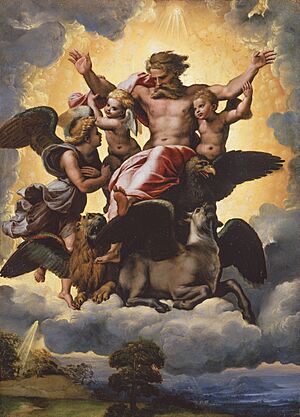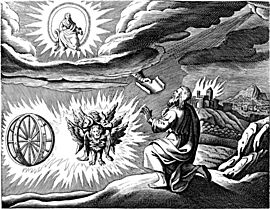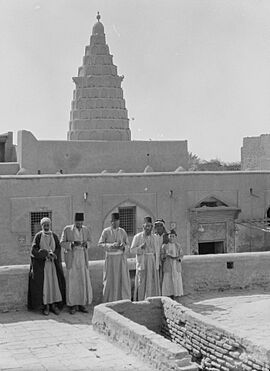Ezekiel facts for kids
Quick facts for kids Ezekielיְחֶזְקֵאל |
|
|---|---|
| Prophet and Priest | |
| Born | Possibly c. 623 BCE Jerusalem, Kingdom of Judah |
| Died | After c. 571 BCE Babylon, Neo-Babylonian Empire |
| Venerated in | |
| Major shrine | Ezekiel's Tomb, Iraq |
| Feast |
|
| Controversy | Babylonian captivity |
Ezekiel, also spelled Ezechiel (/ɪˈziːkiəl/; Hebrew: יְחֶזְקֵאל Yəḥezqēʾl [jə.ħɛzˈqeːl]; Greek: Ἰεζεκιήλ Iezekiḗl [i.ɛ.zɛ.kiˈel]), was an Israelite priest. The Book of Ezekiel, relating his visions and activities, is named after him.
The Abrahamic religions acknowledge Ezekiel as a prophet. During the Babylonian captivity, Ezekiel prophesized the destruction of Judah's capital city Jerusalem, but following the Babylonian siege of Jerusalem, which destroyed Solomon's Temple and brought an end to the Jewish–Babylonian War in 587 BCE, also the restoration of the Jewish people to the Land of Israel in the aftermath.
It is believed that he died around 570 BCE; Ezekiel's Tomb is the most important Jewish religious site in Mesopotamia. The name "Ezekiel" means "God is strong" or "God strengthens" in the Hebrew language. In 539 BCE, three decades after the believed date of his death, the Babylonian captivity ended with the Persian conquest of Babylon and the Jews were subsequently repatriated in an event known as the return to Zion, which began after the Persian king Cyrus the Great issued the Edict of Cyrus.
Contents
Biblical account
The author of the Book of Ezekiel presents himself as Ezekiel, the son of Buzi, born into a priestly (kohen) lineage. Apart from identifying himself, the author gives a date for the first divine encounter which he presents: "in the thirtieth year". Ezekiel describes his calling to be a prophet by going into great detail about his encounter with God and four "living creatures" with four wheels that stayed beside the creatures.
According to the Bible, Ezekiel and his wife lived during the Babylonian captivity on the banks of the Kebar Canal in Tel Abib near Nippur with other exiles from the Kingdom of Judah. There is no mention of him having any offspring.
Chronology
Ezekiel's "thirtieth year" is given as the fifth year of the exile of Judah's king Jeconiah by the Neo-Babylonian Empire, counting the years after the exile in 598 BCE, that is from 597 to 593 BCE. The last recorded prophecy of Ezekiel dates to April 571 BCE, sixteen years after the destruction of Jerusalem in 587 BCE. Based on dates given in the Book of Ezekiel, his span of prophecies can be calculated to have occurred over about 22 years, starting in 593 BCE.
The Targum Jonathan on Ezekiel 1:1 and the 2nd-century rabbinic work Seder Olam Rabba (chapter 26) both say that Ezekiel's vision came "in the thirtieth year after Josiah was presented with a Book of the Law discovered in the Temple", the latter taking place about the time of Josiah's reforms in 622 BCE, shortly after the call of Jeremiah to prophetic ministry around 626 BCE. If the "thirtieth year" of Ezekiel 1:1 instead refers to Ezekiel's age, then he was born around 622 BCE and was fifty years old when he had his final vision.
Extrabiblical accounts
Jewish tradition
According to Jewish tradition, Ezekiel did not write his own book, the Book of Ezekiel, but rather his prophecies were collected and written by the Great Assembly.
Ezekiel, like Jeremiah, is said by Talmud and Midrash to have been a descendant of Joshua by his marriage with Rahab. Some statements found in rabbinic literature posit that Ezekiel was the son of Jeremiah, who was (also) called "Buzi" because he was despised by the Jews.
According to Josephus, Ezekiel was already active as a prophet while in the Land of Israel, and he retained this gift when he was exiled with Jehoiachin and the nobles of the country to Babylon. Josephus relates that Nebuchadnezzar of Babylonia's armies exiled three thousand people from Judah, after deposing King Jehoiachin in 598 BCE.
Rava states in the Babylonian Talmud that although Ezekiel describes the appearance of the throne of God (merkabah), this is not because he had seen more than the prophet Isaiah, but rather because the latter was more accustomed to such visions; for the relation of the two prophets is that of a courtier to a peasant, the latter of whom would always describe a royal court more floridly than the former, to whom such things would be familiar. Ezekiel, like all the other prophets, has beheld only a blurred reflection of the divine majesty, just as a poor mirror reflects objects only imperfectly.
According to the midrash Shir HaShirim Rabbah, it was Ezekiel whom the three pious men, Hananiah, Mishael, and Azariah (also called Shadrach, Meshach, and Abednego) asked for advice as to whether they should resist Nebuchadnezzar's command and choose death by fire rather than worship his idol.
At first God revealed to the prophet that they could not hope for a miraculous rescue; whereupon the prophet was greatly grieved, since these three men constituted the "remnant of Judah". But after they had left the house of the prophet, fully determined to sacrifice their lives to God, Ezekiel received this revelation:
When they went out from before Ezekiel, the Holy One blessed be He revealed Himself and said: 'Ezekiel, what do you think, that I will not stand by them? I will certainly stand by them.' That is what is written: "So said the Lord God: Concerning this too, I will acquiesce to the house of Israel" (Ezekiel 36:37). 'But leave them and do not say anything to them. I will leave them to proceed unsuspecting.'
Christian tradition
Ezekiel is commemorated as a saint in the liturgical calendar of the Eastern Orthodox Church—and those Eastern Catholic Churches which follow the Byzantine Rite—on July 21 (for those churches which use the traditional Julian Calendar, July 21 falls on August 5 of the modern Gregorian Calendar). Ezekiel is commemorated on August 28 on the Calendar of Saints of the Armenian Apostolic Church, and on April 10 in the Roman Martyrology.
Certain Lutheran churches also celebrate his commemoration on July 21.
Saint Bonaventure interpreted Ezekiel's statement about the "closed gate" as a prophecy of the Incarnation: the "gate" signifying the Virgin Mary and the "prince" referring to Jesus. This is one of the readings at Vespers on Great Feasts of the Theotokos in the Eastern Orthodox and Byzantine Catholic Churches. This imagery is also found in the traditional Catholic Christmas hymn "Gaudete" and in a saying by Bonaventure, quoted by Alphonsus Maria de' Liguori: "No one can enter Heaven unless by Mary, as though through a door." The imagery provides the basis for the concept that God gave Mary to humanity as the "Gate of Heaven" (thence the dedication of churches and convents to the Porta Coeli), an idea also laid out in the Salve Regina (Hail Holy Queen) prayer.
John B. Taylor credits the subject with imparting the Biblical understanding of the nature of God.
Islamic tradition
Ezekiel (Arabic: حزقيال; "Ḥazqiyāl") is recognized as a prophet in Islamic tradition. Although not mentioned by name in the Quran, Muslim scholars, both classical and modern have included Ezekiel in lists of the prophets of Islam.
The Quran mentions a prophet called Dhū al-Kifl (ذو الكفل). Although Dhu al-Kifl's identity is disputed, he is often identified with Ezekiel. Carsten Niebuhr, in his Reisebeschreibung nach Arabian, says he visited Al Kifl in Iraq, midway between Najaf and Hilla and said Kifl was the Arabic form of Ezekiel. He further explained in his book that Ezekiel's Tomb was present in Al Kifl and that the Jews came to it on pilgrimage. The name "Dhu al-Kifl" means "Possessor of the Double" or "Possesor of the Fold" (ذو dhū "possessor of, owner of" and الكفل al-kifl "double, folded"). Some Islamic scholars have likened Ezekiel's mission to the description of Dhu al-Kifl. During the exile, the monarchy and state were annihilated, and political and national life were no longer possible. In the absence of a worldly foundation, it became necessary to build a spiritual one and Ezekiel performed this mission by observing the signs of the time and deducing his doctrines from them. In conformity with the two parts of his book, his personality and his preaching are alike twofold.
Regardless of the identification of Dhu al-Kifl with Ezekiel, Muslims have viewed Ezekiel as a prophet. Ezekiel appears in all collections of Stories of the Prophets. Muslim exegesis further lists Ezekiel's father as Buzi (Budhi) and Ezekiel is given the title ibn al-‘ajūz, denoting "son of the old (man)", as his parents are supposed to have been very old when he was born. A tradition, which resembles that of Hannah and Samuel in the Hebrew Bible, states that Ezekiel's mother prayed to God in old age for the birth of an offspring and was given Ezekiel as a gift from God.
Resting place
Ezekiel's Tomb, Iraq
Ezekiel's Tomb is located in Al Kifl, Iraq, near Babylon. Historically an important Jewish site, the Al-Nukhailah Mosque for Shia Muslims was constructed over it. Due to the Jewish exodus from Iraq in the 1950s, the presence of the Iraqi Jewish community has diminished, although a disused synagogue remains in place at the location. In 2020, work was reportedly underway to transform the synagogue into a mosque.
Tomb at Ergani, Turkey
A tomb in the Ergani District of Diyarbakır Province in Turkey is also believed to be the resting place of Ezekiel. It is located 5 kilometres (3.1 mi) from the city centre on a hill, where it is revered and visited by local Muslims, called Makam Dağı.
See also
- Apocryphon of Ezekiel
- Pseudo-Ezekiel
- List of names referring to El





